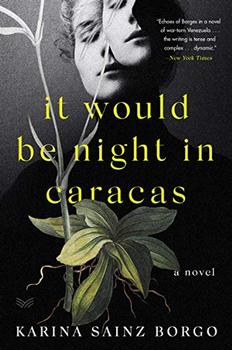Summary | Excerpt | Reviews | Beyond the book | Read-Alikes | Genres & Themes | Author Bio

A Novel
by Daniel Alarcon"All the world's a stage, and all the men and women merely players," wrote Shakespeare in Macbeth. Daniel Alarcón's haunting and atmospheric novel proves this quote to be an aphorism perceptively close to the truth. Set in an unnamed South American country, At Night We Walk in Circles explores concepts of identity and loss, among others, in a soulful story that confirms Peruvian-born Alarcón's status as one of America's most dazzling fiction writers.
Circles is about the necessity for reinvention when it's the only way forward out of a hardscrabble life. Couched as a suspense story, it features a young protagonist, Nelson, who has grown up on a steady diet of revolutionary plays. He holds in high regard the theater group Diciembre, famous for its street performances staged in remote areas of the country torn apart by civil war. During its most active period, Diciembre's leader, a playwright named Henry, was arrested on spurious terrorism charges for his work, The Idiot President, and thrown into jail. Now, more than ten years later, Diciembre is being revived and auditions are being held for that same play.
Things are not particularly rosy for Nelson back home. His older brother, Francisco, emigrated to the United States years ago and, for a long while, failed to help get Nelson's own emigration papers. By the time emigrating became a possibility within Nelson's reach, his father passed away, leaving only him to take care of his needy widowed mother. Looking to escape the confines of a constricting relationship with her, and confused about his allegiances to his girlfriend, Nelson decides a touring theater group might be the perfect antidote to his disillusionment with life in general. He auditions for the play and lands a part. So it is that Nelson, Henry, and a producer called Patalarga put their lives on hold and set off for the Andean countryside. The people they meet on this beautiful and often surreal journey will inform and educate Nelson and at the end, irrevocably alter the course of his life.
Alarcón set his debut, Lost City Radio, in an unnamed South American country as well - one that sounded a lot like his native Peru. In Circles too, there are hints (the forced sterilization program, the gold mines, the guerilla war) that the setting is Peru. The story unwinds as a vivid travelogue set in one picturesque Andean small town after the other. The quaintness of these towns, where time seems to have been frozen in place, adds to the haunting atmosphere Alarcón gives his novel.
There are spectacularly moving snapshots in Circles - as in the section that visits a ghost town simply referred to as T_ - where emigration has inflicted such heavy losses that those who are left behind hang on to the barest of memories of their loved ones: "Time means something very different in a place like T_. As does distance. As does memory," Alarcón writes. "Almost every family had a son who'd gone off into the world. Some sent money; some vanished without a trace. Until proof to the contrary was offered, they were all to be thought of as living. It was the town's unspoken credo." In this sense, the anonymity of the town (and the country) works. T_, Alarcón seems to imply, can stand for just about any South American town, where war and economic forces have wreaked havoc. In one of the most touching scenes I have read in a while, an elderly mother holds on to her son's memory by simply believing that he has somehow found his way to Los Angeles and can't return because he lacks papers. "It was a town where people did not die as much as disappear very slowly, like a photograph fading over time," Alarcón writes of T_.
As Nelson slowly gets caught up in the lives of the people he visits, the line between illusion and reality becomes increasingly blurred. Alarcón brilliantly explores this dichotomy and only an author of his caliber can make us question if lifting the veil to reveal the truth is even necessary or helpful.
"That's what I wanted," the playwright Henry says before the troupe embarks on their tour. "To enter the world of the play, and escape my life. I wanted to leave the city and enter a universe where we were all someone different." At Night We Walk in Circles brilliantly shows just how difficult "escape" can be. The best most of us can do is gain a modicum of comfort from the knowledge that we're all actors on a stage. The problem is: some of us are just better at the craft than others.
![]() This review was originally published in The BookBrowse Review in November 2013, and has been updated for the
September 2014 edition.
Click here to go to this issue.
This review was originally published in The BookBrowse Review in November 2013, and has been updated for the
September 2014 edition.
Click here to go to this issue.

If you liked At Night We Walk in Circles, try these:

by Karina Sainz Borgo
Published 2020
Told with gripping intensity, It Would be Night in Caracas chronicles one woman's desperate battle to survive amid the dangerous, sometimes deadly, turbulence of modern Venezuela and the lengths she must go to secure her future.

by Mark Kurlansky
Published 2018
A city of tropical heat, sweat, ramshackle beauty, and its very own cadence--a city that always surprises--Havana is brought to pulsing life by New York Times bestselling author Mark Kurlansky.
Your guide toexceptional books
BookBrowse seeks out and recommends the best in contemporary fiction and nonfiction—books that not only engage and entertain but also deepen our understanding of ourselves and the world around us.